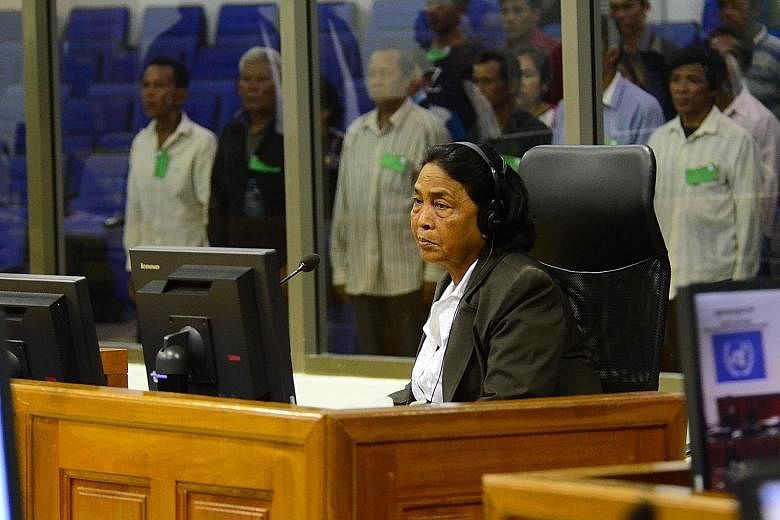PHNOM PENH • In a vast courtroom on the outskirts of Phnom Penh, a middle-aged Cambodian woman described a night nearly four decades ago that she said she had never talked about before.
The local leader of the Khmer Rouge government had assigned her to marry one man but, at the last minute, decided on another, she told the court. On their wedding night in early 1977, she refused his advances.
The man complained to the chief, who raped her and threatened to kill her, before sending her back to live with her new husband.
"I bit my lips and shed my tears," said the woman, identified at the tribunal only as 2-TCCP-274 to protect her identity. She eventually let her husband have sex with her.
The United Nations-backed tribunal investigating the crimes of the Khmer Rouge has turned in recent weeks to an aspect of the radical Maoist regime that has often been overlooked amid its mass killings and other brutalities: regulations governing marriage.
The panel is considering whether the policies amounted to forced marriage or led to sexual assault, both potentially crimes against humanity. The people who have testified so far, most in their 60s, have laid bare the scope of a practice that many Cambodians describe anecdotally, if sometimes, reluctantly.
A wide range of experiences has emerged in court: women set aside for disabled soldiers, militiamen spying on couples to confirm they were having sex, people corralled into group weddings who engaged in desperate ploys to be paired off with vague acquaintances, rather than strangers.
Some couples managed to find mutual compassion under the coercion and built relationships that endured. Others continue to lead lives of quiet regret over the choices that were taken from them.
Prosecutors have estimated, tentatively, that as many as several hundred thousand people were married in Khmer Rouge ceremonies between 1975 and 1979, though there have been no reliable surveys.
The Khmer Rouge's stated policy was to increase the country's population and, in a society with a tradition of arranged marriage, the regime assumed the role of parent to an entire people as part of its utopian project to remake Cambodia.
It held group weddings across the country, but without the customary Buddhist rituals and blessings from relatives and neighbours. The practice, some academics argue, was intended to assert totalitarian control by weakening the bonds of family, community and religion.
Lawyers for the regime's two surviving leaders Khieu Samphan, 85, the head of state, and Nuon Chea, 90, the group's chief ideologue, challenge the notion that the marriage regulations were inherently coercive. The defence has yet to present its case, but at least one lawyer has intimated that Khmer Rouge marriages were simply a variation on traditional arranged marriages. Any coercion or sexual abuse that occurred, both men's defence teams have suggested, was the result of decisions by mid-level Khmer cadres, not state policy.
The tribunal was established in 2006 to examine the effects of the Khmer Rouge's radical policies, which historians say resulted in the deaths of some 1.7 million people.
NYTimes

